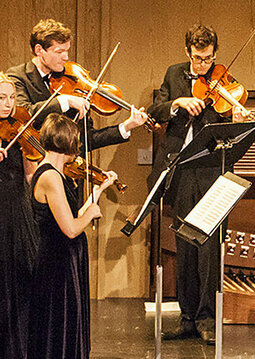Select your tickets
Online sales are closed.
For more information please contact the organizer.
The organizer's data is in the "Brought to you by" section.
Event details
Cork Baroque Players presents ‘Pitched Battles’
Cork Baroque Players presents music of seventeenth-century sieges, soldiers and swords, from the finest composers of the era. In the business of time travel, the Cork Baroque Players bring the music of the past to vibrant life in the present, playing early modern music on authentic instruments of the period. Join them for an explosive evening of seventeenth-century music, rich in stories of the past, and filled with exciting musical interplay.
Across Europe in the seventeenth century, while instrumental music developed and grew more complex by leaps and bounds, a certain taste existed for imitative music, a style which is well-known from Vivaldi’s later ‘Four Seasons’. Some of this music took pleasure in stretching the possibilities of instruments to reproduce the sounds of real life.
While these were often exploited for humour, and the over-emphasis on creating sounds of ‘twittering birds’ was disparaged by some, on the more serious end of the scale were the musical representations of armies and battles. In a Europe ravaged almost unceasingly by conflicts at local regional, and European levels (including the infamous Thirty Years’ War from 1618-1648), it is unsurprising that the sounds of armies and battles would be to the front of composer’s minds. In this concert Cork Baroque Players explores some of the finest of this repertoire inspired by muskets and marches, with composers from Biber and Schmelzer to Farina and Uccellini.
This programme begins with two of the pioneers of excitement and imitation in music, with Carlo Farina’s 1620s ‘Capriccio Stravagante’, a break-through piece creating music pictures of fife bands, marches, and various animal sounds through his creative use of string instruments. Austrian Johann Schmelzer’s ‘Fechtschule’ turns a jolly dance suite into a representation of
swordsmen at their training, with exciting back and forth between the instruments. One of the more famous German composers, Georg Philipp Telemann took inspiration for a suite of music from Cervantes’ classic ‘Don Quixote’, expressing battles with windmill, the gallop of Don Quixote’s horse Rosinante and more, always trailed by the faithful Sancho Panza on his donkey. Schmelzer’s beautiful lament on the death of Ferdinand III, the Hapsburg Emperor during the end of the Thirty Years War.
Access policy

Comments
3